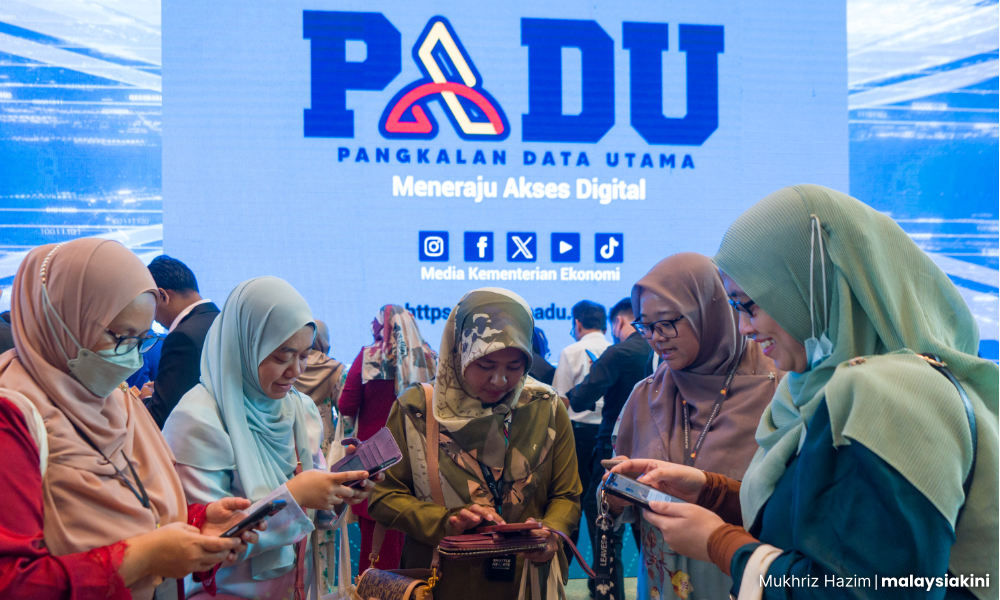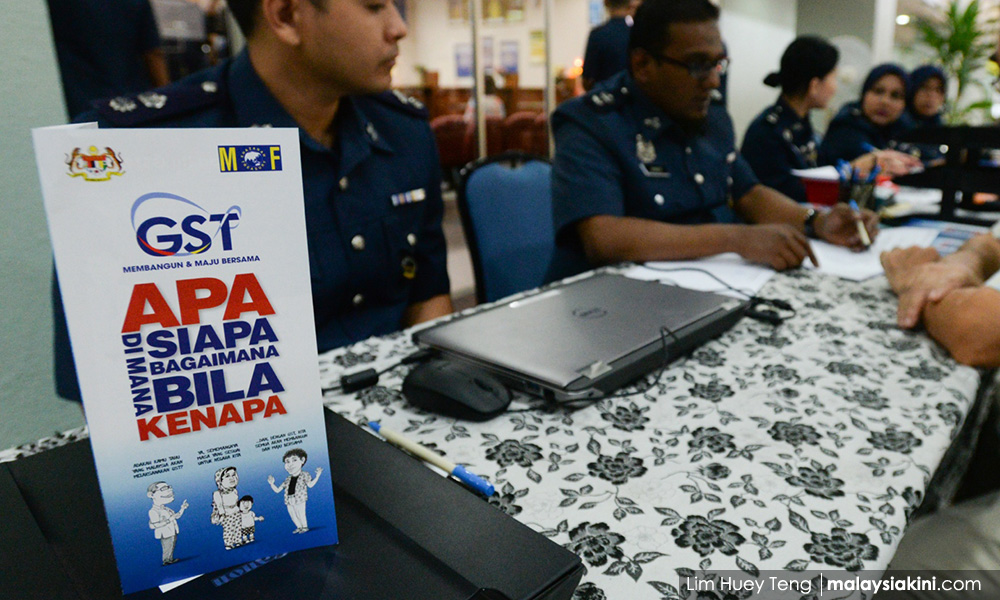The government’s Central Database Hub (Padu) has reached over one million sign-ups in nearly two weeks. While this is far short of the goal of 29 million registrants, it is a positive step towards enriching public data.
The slow registration and its concentration, low in Terengganu, for example, suggest serious obstacles remain.
This piece raises questions about Padu and its implementation. If the government is to introduce targeted subsidies after March this year, there needs to be greater acknowledgement of Padu’s limitations and concrete steps to improve the program and public service infrastructure to support building datasets.
The assumptions, implementation and Padu’s goals need greater reflection and debate.
Persistent distrust in govt and Anwar-led govt
When Padu was announced as a “game changer” the immediate concern was the lack of protection of citizen data, as government data is not covered under existing laws and the Anwar Ibrahim-led government has yet to introduce a new holistic data protection law, although it has mentioned this is under consideration.
In the first week of launching Padu, scholars and data experts highlighted a slew of problems, from password inputs to missing data from different government agencies that could not be confirmed by citizens. While some of the immediate problems were corrected, the underlying broader problem of lack of trust in government handling of citizens’ personal data remains.
The government’s response has been to effectively ignore these concerns, failing to provide a timeline for new data protections or proper reassurance to the public that it will handle private information safely.

More fundamentally, there has been little appreciation of deep-rooted distrust in government, and, in particular, the Anwar-led government. Some of this is suspicion of government generally, a feature that is common globally.
A key dimension, however, is that in Malaysia’s highly polarised politics, more are hesitant to participate in government programs that have been hyped politically to build the legitimacy of a government that they do not support.
The response by leaders involved, to state that the government should be trusted and to remind citizens that registration is necessary for subsidy public funds, has served to ironically dissuade participation, to strengthen resistance to Padu. It is being seen as a unity government policy to be opposed.
The Anwar-led government has yet to fully appreciate the deficits of its public support, especially among Malays and increasingly Indians, and fully appreciate how this could impact policy implementation. So far, many public questions about Padu have been dismissed, even demeaned - a measure that only serves to reinforce distrust.
Improving participation in Padu needs to start with depoliticising its use to legitimise the government, greater efforts to reach across partisan lines and encouraging broad-based cooperation in implementation and participation.
Equally important, participation should not rely on fear of lack of access to funds but also provide reassurances to those who do not register that there will be alternative ways to access subsidies and clearer incentives for registration.
Effective implementation needs to recognise deep-seated public distrust and appreciate the lessons from past experiences such as those in the Covid-19 pandemic that pressure fuels greater resentment against any government. A starting point is to treat public questions about Padu with greater respect and encourage more input rather than dismiss them.
Limitations in data collection
Those advocating for Padu also could be more realistic about the limits of implementation. Foremost, there is little acknowledgement that the data being collected should not be treated as a one-off. Income data, given patterns of employment and realities of changing household structure, changes rapidly.
Just ask a young Malaysian how many jobs they may have had in the past few years. Income is variable, from the palm oil smallholders to Grab drivers taking on extra hours. To date, Padu has been treated as a static, rather than dynamic data-gathering exercise. The risks of data becoming obsolete quickly are real.
There has been no clarity on how data will be checked for integrity. The assumption is that citizens entering the data will do so correctly. There are unclear penalties for providing misinformation to Padu, while there are clear incentives (to access subsidies) to do so.

Globally, one challenge with income data is underreporting, a phenomenon that has led to loss of revenue and leakages in public funds.
It remains unclear how those implementing Padu will check to see if inputted data is correct. The risks of some gaming the system for benefit have yet to be adequately addressed.
Many of the assumptions in the Padu programme also need to be rethought. Who are dependents, for example? Households is a more ambiguous concept than appreciated. Many young people work outside, renting a room, but contribute funds back to their families, or, in some cases, receive funds to support their studies away.
Whose household are they a part of? Income is being defined as part of the formal wages, with less attention to funds provided more informally or through personal networks. Some elderly folk receive support from their children (or give to their children), for example, which is not counted in the income assessment. Among some groups, there are in-kind payments and barter arrangements. The dataset does not properly appreciate the role of the informal economy and social networks.
Public debate has centred on what should be the threshold income to not qualify for subsidies, and what it means to be “rich”. There are grouses about a failure to appreciate the costs of living especially in urban areas. Many in the middle class, who have felt the hard pinch of rising costs, are concerned about the classifications for qualification to subsidies.
Here too, there needs to be more careful thought, appreciation of commutes of drivers and a broader assessment of living expenses for families. Higher incomes do not necessarily mean greater wealth and financial security for many families, especially as many of these are expected to support more members of extended family.
More attention needs to be placed on limits and potential biases in measurement. Before the data is used - before pushing through a policy on targeted subsidies - there should be more checks and analysis of the weaknesses of the assumptions in the dataset. Minimally there needs to be rigorous pilot testing in areas to test the reliability of the data.
Better implementation needed
Perhaps one of the most serious limitations of Padu involves how it is being implemented. Malaysia is not learning the lessons of experiences elsewhere in data collection, especially among disadvantaged groups where trust levels in government are limited.
There are assumptions that the public has cell phones to register, internet access, data and internet literacy, knowledge about the program and clear addresses to complete the data. There is little appreciation of the difficulties of many of those who are poor, especially in more remote areas and among groups such as the elderly and disabled.
Successful data-gathering initiatives among the economically disadvantaged, such as India’s program which has taken multiple years in data collection, involve cooperation with the private sector and non-governmental organisations in public outreach. It began from the premise that a government could not do it alone.
The idea of flying squads - public servant teams - going to the ground for collection is inadequate, as it fails to address the deep distrust and biases of the public servants themselves.
Keep in mind given the denials of public service to people based on clothing and deep-rooted anxieties about inclusion across communities in public service provision, there are reasons for concern. Groups, especially ethnic minorities, disabled, elderly and rural communities, have a higher risk of exclusion.
To date, there has been little engagement with civil society and communities in building a more inclusive data set; there has been little targeting in the implementation of targeted subsidies.
Rethinking purpose
As serious, there has been a lack of questioning of the effectiveness and potential consequences of the Padu exercise. The stated aim has been to address inequalities and poverty through targeted subsidies, with a supplementary aim to save revenue by denying the wealthy access to petrol subsidies. This is supposed to save the government RM2 billion.
Concerning, there has been little meaningful review of subsidy policies and their effectiveness, despite years of implementation. Before developing a new policy, a more careful review of policy effectiveness is needed. It is not clear which groups within Malaysia are meaningfully benefitting from subsidies and whether they are helping address inequality or poverty.
Few appreciate that subsidies are not a sustainable solution to inequalities or poverty. Instead, they are a reflection of these differences, a temporary salve on a more deep-seated, complex set of social problems.
If subsidies were the solution to inequalities, given the breadth of subsidies in Malaysia, these issues would have been addressed decades ago. They have not been. One should ask whether continuing subsidy policies are in fact useful at all or whether efforts should be placed on developing new policies and frameworks.
To suggest that Padu and targeting subsidy application is the “game-changing” solution to Malaysia’s socio-economic divisions could be seen as a disservice to those facing the hardships of exclusion and poverty.
The attention to data collection detracts from difficult discussions about underlying causes of inequalities, including persistent dependence on government funds for support.
Rather than more attention to skill development and drivers of social mobility and the economy, attention is being concentrated on continuing dependence on government support.
There continues to be a lack of substantive discussions on how to address many of the root causes of poverty in Malaysia, with little appreciation that Padu as conceived is following a policy implementation track that has serious limitations.
A response to this may be that the Padu initiative will save the government money, and take money from the rich for the poor. Would not the limited political capital of the Anwar-led government be more effectively allocated toward better implementation of revenue-raising measures such as GST, which could garner a potential RM38 billion?

Could there have been other measures introduced to save on petrol subsidies, such as through credits via tax collection? Elsewhere, income tax reporting, even for low incomes, provides a means for distribution. Expanding filing income tax would have built on an existing and secure dataset, rather than collecting a new one.
It would be worthwhile if the government would clearly identify how much individuals in different income brackets are gaining at the individual level from the subsidies and how leakages are estimated to be part of the subsidy system.
This can be done through focused research rather than creating a nationwide dataset. These inputs could be included in strengthening the creation of a national dataset, a more long-term endeavour as has been the experience globally.
There is the question of whether Padu is where government saving money efforts should be focused. The leakages in government spending are massive. More meaningful anti-corruption measures, rather than targeting political highflyers, might also have been cost-saving for the government.
Those denied subsidies will resent the Padu exercise, especially in light of the persistent high corruption tied to holding political power.
Dividing Malaysia further
Malaysia has long suffered from the problems associated with the divisive implementation of social policies, with the New Economic Policy being a prominent example of exacerbating ethnic resentments.
Now there is a new demonisation in policy approaches, against the rich, or at least those that the government deems as “rich”. They are the new enemy, although some would suggest this framing has parallels of the past with an ethnicised notion of who is “rich”.
Padu has the possibility of building intolerance and dividing Malaysia further. Potentially, every time a person fills up petrol, they will be reminded that they do not qualify, that they need to pay higher taxes, fund the high corruption and accept that they should not get this modest benefit at the individual level. Some are happy to do this. Others are less so, as this will inevitably create resentments and build on pre-existing resentments.
A one-off payment by wealthier Malaysians through their income tax based on car ownership might be a more efficient, less intrusive and resentment-building measure.
As conceived and implemented to date, Padu has not instilled trust and has yet to instil confidence it will achieve its aims. Creating a new central dataset raises serious questions about whether this should be the focus of policy to address inequalities and whether in fact how it is being implemented potentially will have the opposite effect, dividing Malaysia further.
There are real risks of Padu not being a solid solution, as government distrust, rushed implementation and lack of holistic thought about attaining its purpose are dissolving its credibility. Given the importance of addressing inequalities and poverty, a stronger, fairer Malaysia, rushing in rather than more reflection on assumptions, implementation and achieving goals is merited. - Mkini
BRIDGET WELSH is an honourary research associate of the University of Nottingham’s Asia Research Institute, a senior research associate at Hu Fu Center for East Asia Democratic Studies, and a senior associate fellow at The Habibie Centre. Her writings can be found at bridgetwelsh.com.
The views expressed here are those of the author/contributor and do not necessarily represent the views of MMKtT.




No comments:
Post a Comment
Note: Only a member of this blog may post a comment.